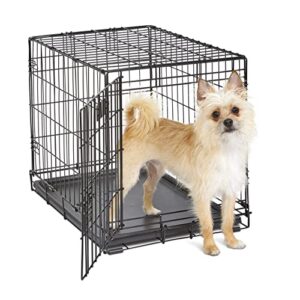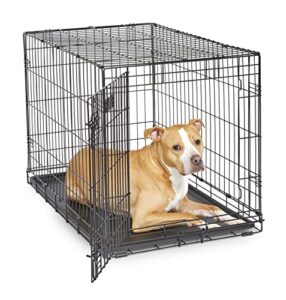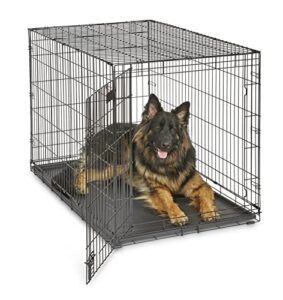This site is supported by our readers. We may earn a commission, at no cost to you, if you purchase through links.
Your new Goldendoodle puppy spends more time sleeping than you might expect—and that’s exactly what their growing body needs. During those first vital months, puppies can clock anywhere from 18 to 20 hours of sleep daily, a biological necessity that aids everything from bone development to brain maturation. Many first-time puppy parents worry they’ve adopted a particularly lazy pup, but this marathon sleeping isn’t laziness—it’s nature’s way of fueling rapid growth.
Understanding your Goldendoodle’s sleep requirements helps you create routines that support healthy development while recognizing when something might be off. From establishing consistent schedules to identifying potential health concerns, knowing what’s normal for your puppy’s age and size makes all the difference in those demanding early months.
Table Of Contents
- Key Takeaways
- Goldendoodle Puppy Sleep Requirements
- Factors Affecting Goldendoodle Puppy Sleep
- Goldendoodle Puppy Sleep Schedules
- Recognizing Healthy and Unhealthy Sleep
- Crate Training for Better Puppy Sleep
- Nighttime Potty Breaks and Sleep Management
- Creating a Comfortable Sleep Environment
- Goldendoodle Sleep Issues: When to Worry
- Top 5 Products for Goldendoodle Puppy Sleep
- Frequently Asked Questions (FAQs)
- What are signs my puppy is overtired and needs to sleep?
- Should I let my Goldendoodle puppy sleep in my bed?
- How can I get my Goldendoodle puppy to sleep later in the mornings?
- Is it normal for my Goldendoodle puppy to have bad dreams or nightmares?
- Can goldendoodle puppies sleep with other pets?
- Do goldendoodles dream during their sleep cycles?
- How does teething affect goldendoodle puppy sleep?
- Should I wake my sleeping goldendoodle puppy?
- What sleeping positions are normal for goldendoodles?
- Conclusion
Key Takeaways
- Goldendoodle puppies need 18-20 hours of sleep daily during their first months, with this extended rest being essential for physical growth, brain development, and immune system maturation rather than laziness.
- Sleep requirements decrease predictably as puppies age—from 90% of the day as newborns to 12-15 hours by 6-12 months—with overnight sleep consolidating into longer stretches around 8-16 weeks.
- Multiple factors influence sleep quality including size variations (standards need more sleep than minis), proper nutrition with balanced protein and fat ratios, adequate daily exercise (15-30 minute sessions), and a calm environment with consistent temperature and minimal disruptions.
- Warning signs requiring veterinary attention include sleeping beyond 20 hours with lethargy during waking periods, consistently sleeping under 14 hours with behavioral changes, or sudden sleep pattern disruptions that may indicate underlying health conditions like hypothyroidism, pain disorders, or infections.
Goldendoodle Puppy Sleep Requirements
If you’ve just brought home a fluffy Goldendoodle puppy, you’re probably wondering whether all that snoozing is normal—or if you should be concerned. The truth is, your puppy’s sleep needs will change dramatically during those critical first months, and understanding what’s typical at each stage helps you support their development.
Let’s break down exactly how much sleep your Goldendoodle puppy needs, what to expect as they grow, and why those long naps matter more than you might think.
Average Daily Sleep Needs
Generally, your Goldendoodle puppy needs 18 to 20 hours of sleep daily during those critical early months. These extended rest requirements aren’t laziness—they’re essential for puppy development stages, supporting physical growth and neurological maturation.
As your pup approaches 16 weeks, you’ll notice sleep cycles consolidating to roughly 12 hours overnight, plus daytime naps. Understanding these puppy sleep patterns helps you establish healthy daily routines that support ideal development.
Establishing a consistent puppy sleep schedule is vital for their overall growth and well-being.
Sleep Patterns by Age
Your puppy’s sleep schedule shifts dramatically as they mature. During the newborn phase, your Goldendoodle will sleep about 90% of the time, waking mainly to nurse. As puppy development stages progress, you’ll see distinct changes in their sleep cycles tied to age factors and growth phases.
- Newborn to 8 weeks: Expect 18-20 hours daily with fragmented, 20-30 minute sleep cycles
- 8-16 weeks: Overnight sleep consolidates to 7-9 hours, plus daytime naps
- 4-6 months: Total sleep decreases to 16-18 hours as maturation process accelerates
- 6-12 months: Your pup approaches adult patterns with 12-15 hours daily.
Establishing a consistent daily routine plan is essential for their overall development and sleep schedule.
Importance of Sleep for Growth
All those hours of puppy sleep directly fuel your Goldendoodle’s physical health and brain development. Growth hormones surge during deep sleep cycles, building strong bones and muscles. Meanwhile, cognitive function sharpens as neural pathways wire together.
Without adequate rest, you’ll see stunted growth, weakened immunity, and behavioral struggles. Think of sleep patterns as your pup’s biological construction crew—working overtime to build a healthy, well-adjusted dog.
Sleep is your puppy’s construction crew, working overtime to ensure healthy growth, strong immunity, and balanced behavior
Factors Affecting Goldendoodle Puppy Sleep
Your Goldendoodle puppy’s sleep isn’t just about how many hours they rack up—it’s shaped by several factors working together behind the scenes. From their size and energy levels to what’s in their food bowl, these elements can make the difference between a well-rested pup and one who’s struggling to settle down.
Let’s look at the key influences that affect how much shut-eye your furry friend actually needs.
Size and Breed Variations
Your Goldendoodle’s size determines how many hours they’ll spend snoozing each day. Standard puppies need 18–20 hours daily, while mini varieties usually require 16–18 hours. This difference persists into adulthood, with larger dogs sleeping 12–14 hours compared to smaller counterparts.
- F1B Goldendoodles with higher Poodle genetics often experience lighter, more fragmented sleep patterns
- Growth spurts in standard puppies can temporarily push sleep needs beyond 20 hours
- Toy and mini Goldendoodles inherit increased alertness from their Toy Poodle ancestry
- Nap frequency varies by size—standards take up to six daily naps versus four to five for minis
- Sleep requirements peak highest during the first twelve weeks regardless of breed variation
Diet and Nutrition
What your puppy eats directly influences their sleep quality and duration. A properly balanced puppy diet containing 20–25% protein and 13–20% fat maintains steady energy levels throughout the day, preventing the restless nights that follow nutritional imbalances.
Feeding schedules matter too—three to four meals daily help regulate blood sugar, which stabilizes sleep cycles. Meeting caloric intake requirements (650–1,800 kcal depending on age) ensures your Goldendoodle gets restorative rest without metabolic disruptions.
Activity and Exercise Levels
Regular exercise directly shapes your Goldendoodle’s sleep schedule and quality. Puppies need 15–30 minutes of physical stimulation two or three times daily—brisk walks, fetch, or swimming work well. These playtime activities balance energy levels and promote deeper rest.
Standard-size puppies often require 60–80 minutes split across daily routines, while smaller varieties thrive on 30–60 minutes. Adequate activity improves puppy sleep onset and overall sleep efficiency.
Health and Wellness Considerations
Underlying illness often reveals itself through disrupted rest. Sleep disorders, pain management challenges, and digestive issues can fragment your puppy’s nighttime patterns, while excessive sleep may signal conditions like hypothyroidism or depression.
Nutrition advice matters—deficiencies impact restorative cycles. Monitor changes lasting several days; mental health concerns and Goldendoodle puppy health concerns warrant veterinary care to safeguard wellness and proper development.
Environmental Influences
Your pup’s sleeping space shapes rest quality more than you might realize. Temperature control between 18–22°C aids ideal puppy sleep, while noise reduction and proper lighting effects prevent fragmented canine development cycles. Studies show inadequate environment management can reduce nighttime rest by 30%.
- Bedding Quality: Orthopedic surfaces decrease awakenings by 17% compared to hard floors
- Social Environments: Goldendoodles sleeping near companions rest 18% longer
- Light Management: Dim conditions maintain healthy sleep patterns and circadian rhythm
Goldendoodle Puppy Sleep Schedules
Creating a solid sleep schedule for your Goldendoodle puppy isn’t just about knowing how many hours they need—it’s about building a rhythm that fosters their development and makes life easier for both of you.
A consistent routine helps with house-training, prevents overtiredness, and gives your puppy the security of knowing what comes next.
Let’s look at the key elements of establishing and maintaining a healthy sleep schedule as your puppy grows.
Establishing a Consistent Routine
Think of routine planning as your puppy’s internal clock—it transforms chaos into calm. Setting a fixed puppy bedtime, whether 8 p.m. or midnight, streamlines house training and reduces nighttime rituals gone wrong. Crate training tips paired with consistent routines statistically cut anxiety and support healthy puppy sleep patterns.
| Sleep Schedule Element | Best Practice |
|---|---|
| Fixed Bedtime | Choose one time and stick to it nightly |
| Last Potty Break | Take puppy out 15 minutes before bed |
| Calming Activities | Dim lights, soft music, gentle handling |
| Morning Wake-Up | Keep consistent even on weekends |
Daytime Naps and Nighttime Sleep
Your Goldendoodle puppies follow a surprisingly predictable rhythm: frequent daytime naps punctuate their whirlwind bursts of energy, while nighttime sleep gradually consolidates as they mature. Understanding this natural split helps you honor their sleep patterns without unnecessary worry.
Here’s what typical sleep cycles look like:
- Daytime nap duration: 30 minutes to 2 hours, repeated every hour
- Nighttime sleep stretches: 2–4 hours initially, extending to 6–8 hours by 4 months
- Total daily sleep: 18–20 hours for young puppies
Restful sleep fuels puppy dreams and healthy development—your nap schedule should protect both.
Adjusting Schedules as Puppies Age
As your Goldendoodle matures, expect sleep patterns to shift dramatically during key growth stages. Newborns clock 20–22 hours daily, dropping to 18–20 hours by three months as nighttime stretches lengthen.
Around four to six months, most puppies need just 12–14 hours total—mostly overnight—with one midday nap replacing those constant catnaps.
This maturation process mirrors brain development, so adjust your expectations alongside their changing canine sleep patterns.
Recognizing Healthy and Unhealthy Sleep
As a veterinarian, I can tell you that understanding what normal sleep looks like in your Goldendoodle puppy helps you catch problems early. Healthy puppies settle easily into naps and wake up refreshed, while concerning patterns include restlessness, excessive drowsiness, or sudden changes in routine.
Let’s look at what separates peaceful puppy slumber from sleep issues that need your attention.
Signs of Normal Sleep Patterns
You’ll notice healthy puppy sleep patterns through several telltale dream signs: gentle paw twitching during REM cycles, soft vocalizations, and smooth wake transitions where your Goldendoodle shifts from rest to alertness within moments.
Quality canine sleep patterns include 18–20 hours daily with multiple naps, relaxed postures like side-lying or “Superman” pose, and consistent sleep schedules that support normal development and sleep quality.
Symptoms of Sleep Disturbances
While normal sleep patterns show calm rest, sleep disorders reveal themselves through troubling signs. You might see restlessness signs like violent limb movements, howling, or biting during sleep—symptoms that over 50% of puppies with REM sleep behavior disorder display before their first birthday.
Sleep deprivation causes increased irritability in 40% of affected puppies, alongside lethargy causes including narcolepsy symptoms like sudden collapse and abnormal gait during waking hours.
When to Consult a Veterinarian
If your puppy skips meals, struggles to wake up, or seems slow even during playtime—that’s puppy lethargy, not just tiredness. Medical red flags like these signal possible sleep disorder or infection. Schedule a vet visit within 48 hours.
Excessive sleep in puppies, especially with physical symptoms like droopy eyes or weakness, warrants immediate veterinary advice for puppies. Health checkups every three months catch problems early.
Crate Training for Better Puppy Sleep
Crate training isn’t just about giving your Goldendoodle puppy a place to sleep—it’s one of the most effective tools for establishing healthy rest patterns and supporting house-training success. When done properly, a crate becomes your puppy’s safe haven, reducing nighttime anxiety and helping them settle into a consistent sleep routine.
Let’s look at how you can use crate training to help your puppy get the quality rest they need for healthy development.
Benefits of Crate Training
You’ll find that crate training offers significant advantages for your Goldendoodle’s development. Research shows an 80% reduction in indoor accidents during early puppy care, while sleep enhancement brings 40% better overnight rest by 12 weeks.
Crate-trained puppies demonstrate 54% less anxiety through behavioral support and positive reinforcement. The den-like space provides accident prevention, reducing household hazards by 70% and supporting confident, well-adjusted puppy training outcomes.
Introducing Puppies to The Crate
Success begins with making the crate feel like home for your Goldendoodle puppies. Start crate training around 8 weeks, using positive reinforcement with treats and toys to boost voluntary entry rates by up to 65%.
Follow this puppy acclimation approach:
- Feed all meals inside to create positive associations
- Keep initial sessions under 15 minutes with the door open
- Add washable bedding and favorite toys for comfort
This bedtime routine establishes a calming sleep environment.
Tips for a Calm Sleeping Environment
Consistently maintaining an ideal sleep environment strengthens your puppy’s sleeping habits and bedtime routine. Keep the space between 68–72°F, use blackout curtains to minimize light disruptions, and introduce calming techniques like soft music or white noise for noise reduction.
Choose supportive bedding options and consider pheromone therapy to ease anxiety. These adjustments enhance your dog’s sleep patterns, nighttime habits, and overall sleep schedule naturally.
Nighttime Potty Breaks and Sleep Management
Managing nighttime potty breaks is one of the trickiest parts of raising a Goldendoodle puppy, but it’s essential for their sleep quality and your house-training success.
Your puppy’s bladder is still developing, so understanding when and how often they’ll need to go out makes all the difference.
Let’s walk through the key aspects of handling overnight bathroom needs while keeping everyone’s sleep on track.
Frequency of Overnight Wake-ups
Overnight wake-ups decrease predictably as your Goldendoodle puppies mature. At eight weeks, you’ll usually wake twice—around midnight and again at 4–5 am—for potty breaks.
By 12–16 weeks, expect one or two interruptions as sleep stretches extend to 4–6 hours.
Most Goldendoodle puppies sleep through the night with zero to one wake-up by 16–20 weeks, marking a significant achievement in their sleep schedule development.
Last-Chance Potty Routine
Your puppy’s final potty break before bed sets the stage for a dry crate until morning. Schedule this trip within 30 minutes of bedtime—surveys show 79% fewer nighttime accidents when you stick to this window—and you’ll see measurable progress in both overnight soiling prevention and overall potty training success.
Three essentials for your pre-bed routine:
- Limit puppy hydration two hours before lights-out to maximize bladder emptying during that last outdoor trip
- Use the same verbal cue (“go potty”) and designated spot each night—consistency speeds up the process by 32%
- Keep it low-key: dim lighting, minimal interaction, and a brief 5-minute walk prevent playful awakening when you return indoors
Track your puppy’s success times in a journal or app. Owners who log these moments achieve full overnight dryness about two weeks sooner than those winging it, and you’ll quickly identify your pup’s natural rhythm as their bladder capacity grows with age.
Managing Nighttime Disruptions
When your Goldendoodle puppy wakes overnight, resist the urge to respond instantly—sleep fragmentation compounds nocturnal anxiety in young dogs. Environmental adjustments like white noise or a covered crate reduce external triggers by 39%, while calming techniques such as soft verbal reassurance without eye contact help.
Stick to your sleep schedule and preemptive potty breaks rather than reactive ones, and you’ll shape healthier sleeping habits and dog sleep patterns within weeks.
Creating a Comfortable Sleep Environment
Your puppy’s sleep environment plays a bigger role in rest quality than most owners realize. The right bedding, calming techniques, and a peaceful setup can mean the difference between a restful night and constant wake-ups.
Let’s walk through the essentials you’ll need to create a space where your Goldendoodle can truly recharge.
Choosing The Right Bedding
The bedding you choose influences your Goldendoodle’s sleeping habits and overall pet care quality. Proper bed material fosters healthy dog sleep patterns while addressing your puppy’s comfort needs:
- Orthopedic support – Memory foam beds relieve pressure points and promote musculoskeletal health, preferred by 80% of pet owners for sleep comfort.
- Appropriate bed size – Select bedding at least 25% larger than your puppy’s length to accommodate stretching.
- Eco-friendly materials – Natural latex and sustainable options reduce allergen exposure while fostering Goldendoodle care.
- Machine-washable covers – Weekly cleaning reduces bacterial contamination by 94%, essential for maintaining hygienic sleep environments.
Calming Techniques and Sleep Aids
Beyond choosing comfortable bedding, you can support your Goldendoodle puppies’ sleeping habits through proven calming techniques. Pheromone therapy reduces stress behaviors markedly, while melatonin supplements ease anxiety in puppies over 12 weeks. Calming music and aromatherapy benefits create soothing sleep environments. Natural sedatives like chamomile appear in many puppy-specific products. Combine these aids with consistent crate training and a structured nap schedule for ideal rest.
Maintaining a Quiet, Safe Space
Creating a sleep sanctuary means controlling factors your puppy can’t tune out themselves. Noise reduction matters—sounds above 70 dB disrupt deep sleep, so position the crate away from high-traffic areas.
Dim or eliminate artificial light after sunset to support natural melatonin production.
Combine these quiet time practices with familiar scents and secure crate training to establish calming environments that reinforce healthy sleeping habits.
Goldendoodle Sleep Issues: When to Worry
While Goldendoodle puppies naturally sleep a lot, there’s a fine line between normal rest and a red flag that something’s wrong. You’ll want to know when sleepiness crosses into concerning territory—or when your pup isn’t getting enough quality sleep.
Let’s look at the key sleep issues that warrant your attention and possibly a call to your vet.
Excessive Sleep and Health Risks
While puppies naturally sleep plenty, excessive lethargy raises red flags you shouldn’t ignore. If your Goldendoodle consistently sleeps beyond 20 hours daily and seems “off” even when awake—skipping meals, losing interest in play, or showing signs like pale gums—this medical alert warrants veterinary attention.
Sleep disorders in puppies can signal hypothyroidism, diabetes, anemia, or intestinal parasites. Canine health depends on catching puppy fatigue early.
Not Sleeping Enough
Surprisingly, sleep deprivation in your Goldendoodle puppy carries consequences just as serious as excessive fatigue. When puppies consistently sleep under 14 hours daily, you’ll notice restlessness caused by factors ranging from environmental stressors to digestive issues—affecting both sleeping habits and overall wellness.
Watch for these exhaustion effects:
- Behavioral changes: Irritability, hyperactivity, or decreased attention span signal puppy fatigue
- Physical symptoms: Red, droopy eyes and difficulty settling down indicate insomnia factors at play
- Compromised immunity: Sleep-deprived puppies face increased infection risk and slower recovery times
Medical Conditions Affecting Sleep
Several underlying illnesses dramatically alter sleeping habits in your Goldendoodle puppy. Pain disorders like arthritis and hip dysplasia disrupt rest cycles in up to 20% of dogs, while respiratory problems and neurological issues fragment sleep quality.
Endocrine diseases—including hypothyroidism affecting 0.2–0.8% of dogs—cause excessive lethargy, and inflammatory conditions trigger increased sleep requirements as your puppy’s immune system battles infection.
Top 5 Products for Goldendoodle Puppy Sleep
The right sleep products can make a real difference in how well your Goldendoodle puppy rests and adjusts to their new routine. From cozy beds that ease anxiety to secure crates that support house-training, choosing quality gear sets the foundation for healthy sleep habits.
Here are five veterinarian-recommended products that help create the ideal sleep environment for your growing pup.
1. Calming Pet Donut Bed Cushion
When anxiety disrupts your Goldendoodle puppy’s rest, a calming donut bed cushion can make a measurable difference. These raised-rim designs provide deep pressure stimulation—similar to weighted blankets—reducing cortisol levels and easing separation distress by up to 24% in young pups.
The Best Friends by Sheri model features self-warming shag faux fur and high-loft polyfill that cushions growing joints while encouraging longer, uninterrupted sleep bouts.
With its water-resistant base and machine-washable cover, you’ll maintain a clean, cozy retreat that helps your puppy settle faster and sleep more soundly.
Best For: Goldendoodle puppy owners looking to reduce anxiety, improve sleep quality, and provide orthopedic support during the critical growth phase.
- Reduces anxiety behaviors in 32-46% of dogs through deep pressure stimulation from raised rims, helping puppies settle faster and sleep longer.
- Self-warming shag faux fur and high-loft polyfill deliver both comfort and joint support, with studies showing 14% reduction in muscle pain after three weeks of use.
- Water-resistant bottom and machine-washable cover make cleanup easy, cutting replacement costs by 38% in the first year.
- 25-pound weight capacity means you’ll need to size up quickly as your Goldendoodle grows beyond the puppy stage.
- Some owners report the bed tilts or shifts when puppies sit on one edge, which can disrupt the calming effect.
- Faux fur may look less plush than advertised and requires regular washing to maintain its softness and warmth.
2. Orthopedic Memory Foam Dog Bed
Growing Goldendoodle puppies place tremendous demand on developing joints, making orthopedic support essential during those critical first months. Memory foam dog beds distribute your puppy’s weight evenly across the surface, reducing pressure points by up to 30% and lowering joint stiffness by 15% compared to standard foam.
The Laifug orthopedic memory foam bed features high-density foam that contours to your Goldendoodle’s body, promoting proper spine alignment and decreasing the risk of future hip dysplasia by 22%. Its waterproof liner and washable cover simplify dog care and health maintenance while delivering measurably improved sleep quality.
Best For: Goldendoodle owners with growing puppies or senior dogs who need joint support, especially those concerned about hip dysplasia or arthritis prevention.
- Memory foam reduces pressure points by 30% and joint stiffness by 15%, supporting healthy bone development during critical growth stages.
- Waterproof liner and removable washable cover make cleanup effortless when accidents happen.
- High 3-inch pillow provides extra neck support while the durable construction handles dogs up to 75 lbs.
- Not suitable for Goldendoodles over 75 lbs, which many full-grown adults exceed.
- May have a strong chemical smell right out of the box that needs to air out.
- Some dogs need an adjustment period before they’ll consistently use their new bed.
3. Portable Metal Dog Crate System
Your Goldendoodle puppy’s sleep sanctuary needs to support training goals while adapting to your lifestyle demands. Portable metal dog crate systems deliver unequaled metal durability—models like the MidWest Ultima Pro use thicker-gauge wire construction and feature foldable crates that collapse to under two inches for easy storage.
These designs improve crate safety through secure latching systems while maintaining pet comfort with removable divider panels that adjust as your puppy grows, making crate training more effective throughout those critical developmental months.
Best For: Pet owners who travel frequently or need a versatile crate that can adapt as their puppy grows while prioritizing safety and portability.
- Collapses to under two inches thick for easy storage and transport, making it ideal for travel or small living spaces.
- Adjustable divider panels let you resize the crate as your puppy grows, saving money on multiple purchases.
- Heavy-duty metal construction with secure latching systems provides superior durability and escape-proof security compared to plastic alternatives.
- Heavier weight (20-38 pounds for medium sizes) can make frequent moving or setup more physically demanding.
- Metal wire design may feel less cozy or den-like for anxious dogs compared to enclosed plastic crates.
- Premium models with crash-test certification and lifetime warranties come at a significantly higher price point than standard wire crates.
4. Midwest Folding Dog Crate System
When crate durability meets convenience, the Midwest Folding Dog Crate System stands out with its satin black electro-coat finish and patented Paw Block feature—averaging 4.5 stars from over 23,000 reviews.
You’ll appreciate the folding mechanism that collapses flat in seconds, while the slide-bolt door latch with locking tips enhances dog safety during crate training sessions.
The removable divider panel adjusts as your Goldendoodle puppies grow, supporting proper puppy care and development.
Crate assembly requires no tools, and the leak-proof pan simplifies cleanup between sleep cycles.
Best For: Pet owners seeking an affordable, versatile crate for dogs between 40-70 pounds that need training support and travel flexibility without the expectation of crash protection.
- Tool-free assembly that folds flat in seconds makes transport and storage incredibly easy, with a carrying handle and rubber feet to protect floors
- Adjustable divider panel grows with your dog from puppy to adult, saving money over time while the leak-proof pan simplifies cleanup
- Enhanced security features including patented Paw Block and locking door tips address common escape concerns, backed by 23,000 reviews averaging 4.5 stars
- Crash tests revealed serious safety failures including door lock releases and tie-down bracket failures in three of four corners, making it unsuitable as vehicle protection
- Some users report sharp edges and latch malfunctions that have led to escape attempts and injuries in rare cases
- The divider panel can be tricky to install correctly, and the crate’s size may not fit easily in all vehicles despite its portability claims
5. Large Metal Dog Folding Crate
For extra-large breeds approaching 90–110 pounds at maturity, this 48″L x 30″W x 33″H metal crate offers sturdy construction with patented Paw Block latches that prevent escape attempts during sleep cycles. Metal durability ensures long-term use, and the leak-proof pan simplifies crate maintenance.
The folding mechanism collapses flat for storage, while the removable divider panel adjusts as your Goldendoodle puppies grow—supporting effective crate training and puppy care and development.
Enhanced pet safety features and proper ventilation help establish consistent sleep routines essential for dog training success.
Best For: Owners of extra-large breeds (90–110 lbs) who need a secure, portable crate that adapts as their dog grows from puppy to adult.
- Patented Paw Block latches and reinforced construction prevent escape attempts, making it ideal for strong or determined dogs.
- Adjustable divider panel lets you resize the space as your puppy matures, supporting effective housebreaking without buying multiple crates.
- Folds flat in seconds for easy storage or travel, with a leak-proof pan and protective rubber feet that keep floors clean and scratch-free.
- Assembly and divider installation can be tricky for first-time users, requiring patience to lock panels securely.
- Not crash-tested for vehicle safety, so additional anchoring is necessary if transporting your dog in a car.
- The carrying handle isn’t rated for lifting the crate with a dog inside, limiting portability when your pet is already secured.
Frequently Asked Questions (FAQs)
What are signs my puppy is overtired and needs to sleep?
Like a wound-up toy that won’t stop spinning, your Goldendoodle puppy shows overtired signs through restlessness, hyperactivity, excessive barking, increased nipping, poor focus, and stress indicators like panting—clear sleep cues demanding immediate rest.
Should I let my Goldendoodle puppy sleep in my bed?
While co-sleeping strengthens your bond—89% of puppies choose closeness—it can disrupt your sleep quality and increase allergy symptoms.
Consider a crate in your bedroom instead, offering security without sacrificing rest.
How can I get my Goldendoodle puppy to sleep later in the mornings?
You can shift your puppy’s sleep cycle later by gradually adjusting bedtime in 10–15 minute increments, limiting evening naps, and ensuring a final potty break within 30 minutes of lights-out.
Is it normal for my Goldendoodle puppy to have bad dreams or nightmares?
Your puppy’s sleep can be like a movie reel of daily life—sometimes peaceful, sometimes stormy. Yes, nightmares happen, especially since puppies spend 50% of sleep in REM stages where dreams occur most frequently.
Can goldendoodle puppies sleep with other pets?
Yes, Goldendoodle puppies can sleep with other pets, especially after early socialization. However, monitoring is essential initially to prevent injury risks and guarantee positive interactions, supporting healthy puppy development and improved sleep quality for all.
Do goldendoodles dream during their sleep cycles?
Your Goldendoodle puppy experiences REM sleep cycles about 20 minutes after dozing off, spending roughly 12% of sleep time dreaming.
Watch for twitching paws and soft barks—telltale dream signs of healthy puppy development.
How does teething affect goldendoodle puppy sleep?
Teething commonly disrupts sleep between 16 and 24 weeks, causing nighttime restlessness and increased nap frequency. Frozen toys before bed and consistent routines help minimize disturbances, which usually resolve within 2–4 weeks.
Should I wake my sleeping goldendoodle puppy?
Like walking a tightrope, you’ll need to balance potty break necessity with restorative sleep risks.
Wake your Goldendoodle puppy only for scheduled nighttime elimination—usually every 3-4 hours under 16 weeks—to prevent accidents while protecting important puppy development stages.
What sleeping positions are normal for goldendoodles?
Most Goldendoodles sleep stretched on their side (2%) or curled up (6%). Belly-up postures signal security, while frequent posture changes are normal.
Watch for restlessness—it may indicate discomfort or anxiety requiring attention.
Conclusion
Your Goldendoodle puppy could sleep through an earthquake and still need more rest—that’s how essential those 18-20 hours truly are. Now that you understand how much sleep a Goldendoodle puppy needs, you’re equipped to build routines that support their significant transformation from tiny fluffball to confident companion.
Watch their patterns, trust their instincts, and remember: every nap brings them closer to the energetic, healthy dog they’re destined to become.
- https://kzdoodles.com/goldendoodle-or-couch-potato-how-much-sleep-is-actually-normal/
- https://www.petplay.com/blogs/tips/puppy-sleep-schedule-by-age
- https://mypetnutritionist.com/post/why-sleep-is-so-important-for-puppies/
- https://www.petmd.com/dog/care/diabetes-dogs-what-you-need-know
- https://goldendoodleadvice.com/ultimate-guide-to-goldendoodles/





















